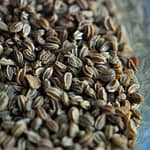Ajamoda is one of the most important herbs described in Ayurveda for its healing properties. Known to cure a number of ailments, Ajamoda leaves were used by ancient Grecians to make crowns for their star athletes. The botanical name of Ajamoda is Apium graveolens where Apium means bees and graveolens means perfumed. This name has been given considering that bees get attracted towards the sweet-smelling off white flowers of Ajamoda. In English, the herb has been named as Celery and Ajmuda or Ajmod in Hindi. Ajamoda is often confused with Ajwain, however, Ajamoda can be considered as a stronger version of Ajwain.
Ajamoda: Anatomy And Distribution
Apium graveolens or Celery or Ajamoda belongs to the family Apiaceae. It is a herbaceous plant which grows annually or biennially. Ajamoda has been cultivated since antiquity with its stem being eaten as a vegetable and its seeds used as spices as well as medicine. It can grow up to 1 m tall bearing small off white flowers. The fruits are quite aromatic with a diameter varying between 1 mm to 2 mm.
Although Ajamoda can be found all around the globe, it prefers marshy soils. In fact, it is believed that Ajamoda was first cultivated in the Mediterranean region. The plant has had two ancestors. One was cultivated for its leaves and stalks and the other for its roots.

Uses And Properties
Ajamoda has the following uses:
- It is consumed as a vegetable all around the world. In the cajun cuisine, it is considered as a part of the holy trinity.
- Celery seeds are used as a spice.
- The root extract or dried leaves of the plant are used to make salt.
- A number of medicinal uses of Ajamoda have been described in traditional medicine systems like Ayurveda.
Nutrition Information
Consumption of these small celery seeds can prove to be quite beneficial considering the amazing nutrition profile they possess. Ajamoda is rich in the following nutrients:
|
Nutrient |
Percentage |
|
Calcium |
11% |
|
Zinc |
3% |
|
Manganese |
25% |
|
Iron |
16% |
|
Magnesium |
7% |
|
Phosphorus |
4% |
|
Potassium |
3% |
|
Vitamin A |
8% |
|
Vitamin C |
5% |
|
Vitamin B 6 |
5% |
|
Protein |
2% |
|
Fibre |
3% |
|
Fat |
3% |
Its properties include:
- Antifungal
- Anti-bacterial
- Antiviral
- Antispasmodic
- Anti helminthic
- Anti-inflammatory
- Anticancer
- Anti-tumour
- Antidiabetic
- Antioxidant
- Diuretic
- Aphrodisiac
- Laxative
- Sedative
- Carminative
- Emmenagogue
- Abortifacient
- Choleretic
- Purgatory
- Expectorant
- Hepatoprotective
- Hypoglycemic
- Lipolytic
- Nervine
According to Ayurveda, Ajamoda has the following functions:
- Netramaya – Useful in eye-related disorders
- Krumi – Works against worm infestations
- Hikka – Useful in hiccups
- Deepani – Can help in improving the strength of the digestive system
- Hrudya – Is helpful in heart-related disorders
- Chardi – Useful in controlling vomiting
- Balakari – Helps in improving the strength of the body
- Bastiruja – Beneficial in problems related to the urinary bladder
- Vrushya – A natural aphrodisiac
Ajamoda’s Ayurvedic Properties or Gunadharma
- Physical property (Guna) – light (laghu), dry (ruksha) and piercing (tikshna)
- Taste (Rasa) – bitter (tikta), astringent (katu)
- Potency (Veerya) – ushna or hot
- Conversion after digestion (Vipaka) – pungent after digestion
- Effect – balances vata and kapha
Ajamoda has been categorized under different segments by ancient Ayurved scholars:
- Charaka classifies the herb as
- Deepaneeya – herbs that help in improving the strength of the digestive system
- Shula Prashamana – abdominal colic pain-relieving herbs
- Sushruta, Vagabhatta and Raja Nighantu classifies as
- Pippalyadi – a group of herbs that can help improve appetite
This is what Bhava Prakash writes about Ajamoda:

Ajamoda or Celery Seeds Benefits
Good For Bones
Ajamoda is rich in calcium, phosphorus, magnesium and manganese; all of which are important to maintaining a good bone mineral density. Calcium as we all know forms that basis of our bones. Phosphorus and magnesium are responsible for the formation of osteoblasts, often called the bone-building cells. And manganese is important because it helps in activating the enzymes which produce bone formation proteins.
Whenever our body lacks any mineral, especially calcium, it compensates for it by extracting it from our bones; thus reducing the bone mineral density. A low density means weak bones which are more prone to fractures and injuries. It also becomes a reason behind a number of old age problems associated with weak bones like osteoporosis in women.

Helps In Managing Blood Pressure
Ajamoda is diuretic in nature. Diuretic substances prevent the accumulation of extra water in the body. High potassium to sodium ratio in Ajamoda is the reason behind its diuretic nature and makes it useful in relaxing blood vessels. This nature of ajamoda makes it useful in the management of blood pressure as it works like just any other diuretic drug. In fact, in a study performed in 2013 on a number of patients suffering from high blood pressure, ajamoda helped in decreasing systolic as well as diastolic blood pressure.
Blood Sugar Management
Whenever our body suffers from abnormal blood sugar level, it increases our susceptibility towards diabetes and even a number of heart diseases. Ajamoda can be of great help in such a case. It is rich in the mineral magnesium. Magnesium has an important function with regard to our blood sugar. It not only helps in keeping an optimal level but also improves the response of our cells to insulin, the hormone behind keeping blood sugar levels stabilized. In fact, it is a proven fact that including foods rich in magnesium in your diet can significantly reduce the risk of diabetes.
Is Amazing For The Digestive System
Many of us go through a number of problems related to the digestive system on a day to day basis. In fact, whenever our digestive system fails to function properly, it brings on with it issues and complications related to other parts of the body too. Ajamoda consumption can prove to be quite beneficial to keep the digestive system function smooth. It can help in kindling the digestive fire, cure the deepest rooted constipation and provide relief from stomach aches caused due to buildup of gas.
Suggested Remedy: Ajamoda can be consumed in combination with fennel, ginger, coriander, cumin and cardamom when suffering from poor digestion.
Can Improve The Count Of Red Blood Cells
Ajamoda being a rich source of iron is also beneficial in increasing the red blood cell count of the body and improving the haemoglobin level. Most of the women, especially belonging to the lower strata of the society suffer from anaemia which is caused due to acute iron deficiency. Such women go on to give birth to malnourished children. Since they cannot afford high-quality iron supplements, it becomes difficult for them to cure their disorder. In fact, any kind of vitamin supplements can never be the substitute for the vitamins and minerals taken from a natural source. Thereby in such cases, ajamoda can be the way to go.
Helps Relieve Joint Pains
As mentioned earlier, ajamoda is extremely beneficial for strong and healthy bones. But this is not enough. It carries additional properties which make it equally beneficial for keeping our joints healthy. Ajamoda is a good anti-inflammatory agent and hence it can prove to be useful in all disorders which cause inflammation of the joints, like arthritis. It not only provides relief against the pain but also is devoid of any of the side effects which drugs like ibuprofen and aspirin carry.
Ajamoda is also a diuretic substance. This means that it prevents the accumulation of uric acid in the joints. Excess of uric acid leads to problems like gout which is a very painful disorder of the joints.
Keeping Infections At Bay
Ajamoda is a storehouse of Vitamin C, which is the most important Vitamin when it is about keeping infections at bay. It helps improve the immunity of the body and thus the body’s own ability to fight the infection improves thus creating a natural shield against a number of infections.
Powerful Antioxidant
Free radicals can lead to the formation of cancerous tumours in the body. Being rich in Vitamin C makes Ajamoda a potent antioxidant as well. Hence, apart from keeping away the common flu, Ajamoda is equally beneficial in fighting perilous disorders. It washes away the free radicals and even prevents their buildup and protects the body against excess oxidative stress.
The presence of polyphenols in Ajamoda is also one of the major reasons behind its anti-free radical activity. In fact, polyphenols can help lower the risk of not only cancer but diabetes and heart diseases too.
Anti-bacterial
Ajamoda is a potent anti-bacterial herb. In 2009 a study was conducted to check the antibacterial nature of Ajamoda and it proved to be quite effective against the H pylori bacteria which affects the stomach and causes stomach ulcers.
Eases Out Menstrual Cramps
Menstruation in most women is accompanied by painful cramps. Maximum women opt for pain killers to ease out pain, without thinking about the dangerous side effects these drugs come with. It is a natural analgesic and is the best replacement for these painkillers. It not only reduces pain but also makes the flow smooth.
Other Benefits
- Consuming it regularly can help improve one’s vision. This is due to the presence of a good quantity of Vitamin A.
- Ajamoda is nervine that is it can help calm the nerves. This property of Ajamoda is attributed to the presence of Magnesium which shows a calming effect on the nerves. Hence consuming Ajamoda can help drive away your stress and anxiety.
- It can be beneficial in the treatment of respiratory issues like bronchitis, excess cough and even asthma.
- Ajamoda with a good concentration of sodium and potassium can help maintain the electrolyte balance of the body. Hence it can be given at the time of dehydration and diarrhoea when the electrolyte balance is severely affected. It can also help in regulating the acidity and alkalinity level of the body.
- It has been called a natural aphrodisiac by Ayurveda and can help boost libido, especially in men.
Dosage Information
It is recommended to consume 1 to 3 grams of Ajamoda per day. However the dosage can vary according to the problem for which it is being consumed and also according to the form in which it is being consumed (like arka or churna).
Side Effects And Precautions
If taken in limited quantity, Ajamoda does not have any major side effects; however there are certain cases where precaution needs to be taken:
- Being diuretic in nature, Ajamoda can cause irritation to the kidneys and hence all the people suffering with kidney related issues should remain cautious.
- People with high pitta also need to take care as Ajamoda can cause hyperacidity because of its property of increasing bile formation.
- It can cause dryness in the body.
- Since it can cause uterine contractions, pregnant and lactating women should refrain from consuming it.
- It can even provoke allergic reactions and hence must be taken under the guidance of a medical practitioner.
Did you find this post useful? Would you like to get back to it later? Save THIS PIN below to your Pinterest Natural Living or Ayurveda board!

